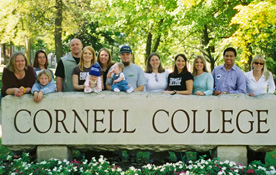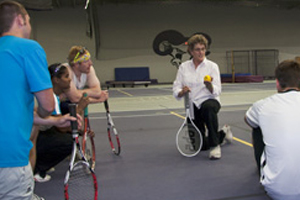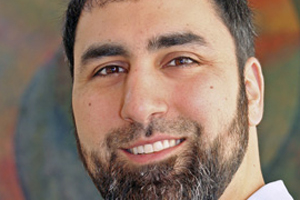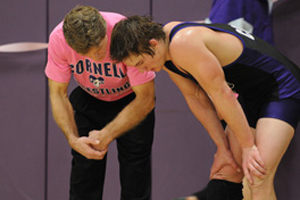The meaning of a Cornell education
Cornell’s last class of the 20th century is now helping shape the way Cornell serves students of coming generations. About 40 members of the Class of 1999 were interviewed at length in 2009–2010 to gain perspectives on all aspects of their Cornell experience 10 years after graduation, while another 40 or so classmates responded in writing to mailings and online surveys.

The responses build on data collected from 200 members of the same class in 2001 as they began their lives after Cornell. Becki Elkins, director of institutional research and assessment, said the 2001 phone survey focused largely on questions related to post-graduate education and employment. The results of this data sparked an interest in following the class into the future, and Elkins said the 2009 survey had two main goals.
“First, we wanted to continue that original line of questions, which was really ‘what have you been doing?’ The other component was to ask what meaning a Cornell education had in their lives 10 years after completing their degrees.”
Identifying themes to guide decisions
Elkins designed the study, and interviews were conducted by RJ Holmes ’99, director of career engagement programs, and Jonna Higgins-Freese, formerly a research associate and now the college’s registrar. Elkins stressed that the transcribed interviews and written submissions add up to more than a collection of anecdotal information; the team is now identifying themes and coding individual responses to develop a more meaningful portrait of Cornell’s strengths and areas for improvement.
Five initial themes emerged fairly quickly: preparation for life after Cornell, caring community, liberal arts, leadership and service, and One
Course At A Time. These themes are now being refined and investigated more deeply.
“The important thing is to get the information into the hands of key decision makers as they consider changes to the curricular and co-curricular programs,” Elkins said. “And part of what the study might show them are ways in which we’re already doing the right stuff.”
Holmes cited the Berry Center for Economics, Business, and Public
Policy, founded in 2007, as an example of “the right stuff.” He noted that the Berry Center emphasizes internships, off-campus study, and applied learning in employable fields—exactly the types of undergraduate opportunities many respondents felt aided them, or could have aided them, in their post-Cornell endeavors.
“There are things we’re doing now, like the Berry Center, that we weren’t even thinking about 10 to 15 years ago, and there are things that aren’t even on our radar screen now that we need to start thinking about,” Holmes said.
“For example, as we move toward having a more intentional first-year experience, or as we think about growth and the impact it might have on the caring community, this study will help us raise questions and guide the discussion,” Elkins added.
Survey Excerpts:
The following excerpted quotes exemplify both the common themes and the range of responses gleaned from the class of 1999 during their 10-year follow-up survey. In some cases the quotes have been edited slightly from the original transcription to improve readability without altering context or meaning.
Preparation for Life after Cornell
While some students identified shortcomings in their education, all indicated that Cornell had given them skills that helped in all areas of life: jobs, parenting, graduate study, public service, etc.
- “Grad school was hard because it was the first time I had to take four and five classes at a time. But all the things that you had to do on the block plan—reading and essays and assignments in class all the time—prepared me for that level of challenge and rigor.”
- “A liberal arts education helped me have a really broad view, and at a startup company I was able to learn so many different aspects of the business. I could just open my mouth and it was plain that I was curious, and people would give me work. It was kind of nice; having that curiosity gets you a long way. I attribute that to Cornell College, just those certain classes and professors I had.”
- “At Cornell I learned that somebody is going to notice when I’m not in my seat because there are only 11 other people in the room. That accountability carries
throughout your life. When you’re in a meeting, you’re not in a meeting with 300 people very often; you’re in a meeting with 10 other people and you have to be mentally present. And that’s something I got at Cornell.”
Caring Community
Graduates stressed the importance of close personal relationships on campus and noted a sense of support, caring, and accountability that has
often extended into their lives after Cornell.
- “I think it’s very important for people, when possible, to go to a residential college, to live on campus, to live in a dorm, and to have that experience. My experience was positive. My experience with professors was they knew me, they interacted with me, they wanted to hear what I thought. I got the experience of learning to contribute in a learning environment, finding things I was successful in.”
- “Though it sounds odd to say, social connections with people that I know from my college time are more important than my education. They’ve become my connections in business and in the social world; they’ve become my best friends and family.”
- “I’m not from Iowa, but I have this strange sort of connection to it that I would never have predicted. Cornell embodied a lot of the values that I think are really important, and that’s why I decided to come back and to spend the rest of my life here.”
Liberal Arts
The term graduates most often used to describe their liberal arts education was “well-rounded,” while noting the benefits of small class sizes, close relationships with professors, and an intellectually rich learning environment.
- “The professors care about teaching. They are quality teachers first. The stories, the readings, and the way they evoked discussions in the class were great. I learned a lot from them—they were topnotch people you wanted to be associated with, personally and professionally.”
- “What I tell people is that going to a liberal arts school means you can do anything. It means you’re not pigeonholing yourself into any particular trade. It fell short for me in a couple of areas, but you certainly get out of it whatever you put into it.”
- “I probably wouldn’t have been a psych major had I gone someplace else. Politics, yes, that was always the plan … I took a music class, I stunk at it, but it was fun. I took some geology courses, science requirements, things I would have avoided with every fiber of my being. I have great memories of some of those classes even though they weren’t major requirements.”
Leadership and Service
Many respondents indicated that Cornell provided opportunities for leadership and instilled the importance of giving back to the community.
- “Cornell was a really great place, because it was the first place that I learned to be politically active and find a voice, and it got me to be a little more comfortable with myself in that capacity.”
- “The service that Cornell stressed, that work ethic, that vibe I got at Cornell—I wanted to carry that on. I try to practice what I can preach and try to instill that in others. You shouldn’t be too busy or too big or too important to help somebody in need.”
- “Going to college at Cornell was this absolutely immense culture shock experience for me. In [my very segregated urban] high school we were given the opportunity to do diversity awareness programs, but it was thrown into my face on arriving at Cornell, and I loved it. And it was neat because my first friends at Cornell were not Caucasian.”
One Course At A Time
Graduates talked about the intense nature of OCAAT and valued the way it taught them to focus and work well under tight, frequent
deadlines.
- “Taking one class at a time was good in some ways, bad in other ways. It didn’t really teach you how to multitask. But it did get you a good focus on what you were doing, and deeply immersed in it.”
- “One Course At A Time is superior to any other way of structuring courses because it exposes deeper connections between different courses than are on the surface. Having them so close together and so deep, so fast, I felt like I was becoming more and more fluent and flexible and confident in my ability to absorb information and articulate it.”
- “I’ve always been a big fan of the block plan. I think it mimics life more than other regular college courses do. I really believe that, when you’re in life, when you’re working on a project, you’re focusing on one major project. We do a lot of different projects, but when we focus on it, we focus on it and get it done.”



